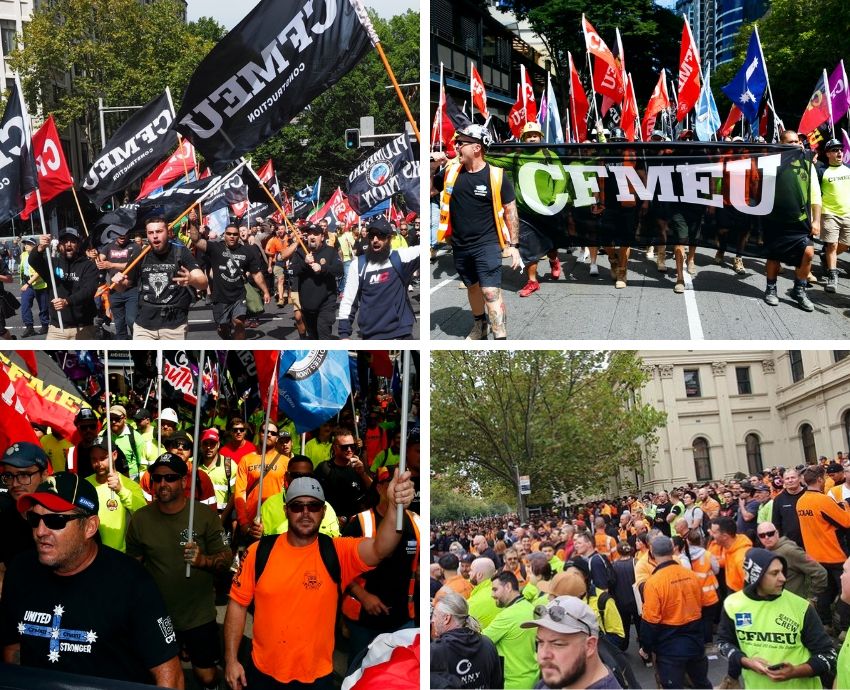
Thousands of construction workers from the Construction, Forestry, Mining and Energy Union, along with some other unions, took to the streets on April 5 in a national day of action, organised by the Building Industry Group Unions (BIG).
BIG includes the Construction Forestry Mining and Energy Union (CFMEU), the Electrical Trades Union (ETU), the Australian Manufacturing Workers Union (AMWU) and the Plumbing and Pipe Trades Employees Union (PPTEU).
Jacob Andrewartha and Sue Bolton report from Naarm/Melbourne that thousands walked off the job and marched from Victorian Trades Hall to the Fair Work Commission to protest corporate greed and the cost-of-living crisis. The Victorian Trades Hall Council supported the protest.
A group of Visy cannery workers, from Shepparton, led the march. They have been on the picket line for more than 10 weeks, fighting for a liveable wage.
Officials from the CFMEU, ETU, AMWU and PPTEU said corporate greed is driving inflation and demanded that Labor repeal the Coalition’s anti-union laws, and support for a 7% wage rise for low-wage workers.
Geelong CFMEU delegate Tim Gooden told Green Left: “All workers are struggling. It’s up to strong unions to lead the way. Workers need a 7% wage increase and the rich liberals sitting on the bench of the Fair Work Commission will not give it to them unless we fight for it. That’s why I’m here today with the CFMEU.”
CFMEU Victorian Secretary John Setka told the rally that “construction workers are constantly under attack” from politicians, bosses and 3AW, for earning “too high wages”. “What they don’t see are the hours we work and the dangers we face. The construction industry is the most dangerous industry.”
Setka reminded the rally that while Labor had removed the Australian Building and Construction Commission (ABCC), lots of anti-union laws, enacted under former Prime Ministers John Howard, Tony Abbott and Scott Morrison, remain in place.
They include “Personal Payment Orders” which are designed to intimidate workers. These orders apply when “unauthorised” industrial action is taken. A worker has to prove that they, not the union, have paid the large fine.
Another of these laws allows bosses to withhold four hours of pay when workers hold a short stop-work meeting that is not deemed to be protected action. Setka said these laws must go.
A motion from CFMEU National Secretary Zach Smith, which called on Labor to deal with the cost-of-living crisis, abolish anti-union laws and address wage theft, was passed unanimously.
Alex Bainbridge reports from Meanjin/Brisbane that the CFMEU marched from Queens Gardens to the Federal Government buildings, calling for the Fair Work Ombudsman to be abolished.
The union regards it as an ideological police force directed against construction unions. It continues the Howard-era ABCC, but under a different name.
The protest marked the beginning of the union’s campaign leading up to Labor’s national conference in August in Meanjin. Unions called on the Anthony Albanese government to stand by its pre-election commitment to abolish the ABCC.
Sam Wainwright reports from Boorloo/Perth about 100 workers, nearly all CFMEU members from the CBD sites, joined the protest.
Jim McIlroy reports from Warrang/Sydney that thousands of building workers rallied in Belmore Park before marching to NSW Parliament. Their focus was for a ban on the use of silica in construction products.
The CFMEU has long been campaigning against “engineered stone” which they describe as “the asbestos of the 2020s”.
The ACTU said that more than half a million workers are exposed to silica dust every day on the job and more than 10,000 are predicted to be diagnosed with silicosis.
NSW CFMEU secretary Darren Greenfield told the rally that “Every day we wait, another worker dies”. He said the union would ask the new NSW Labor government for “a ban on silica in industry and an end to the state anti-union industrial laws”.
CFMMEU national secretary Chris Cain told the crowd that the NSW Labor government showed “When workers get together they can change governments”.
He added that “if Labor governments don’t take notice of our demands, we will take action … We want real cost-of-living wage increases and good, safe jobs throughout industry.”
Maritime Union of Australia (MUA) Sydney branch secretary Paul Keating said: “Now’s the time to start organising general strikes for industrial safety, real pay rises and the right to strike. The MUA stands fully with the construction unions over the dangers of silica. If the politicians won’t act, the MUA won’t unload the stuff off the ships in the first place.”
Keating described the Fair Work Ombudsman as “a tool of the bosses against the unions” and said that it and the Fair Work Act need to be abolished.